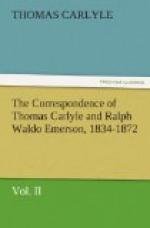Munroe & Co. allow some credits, but charge more debits for binding, &c., and also allege few sales in the hard times. I have got a good friend of yours, a banking man, to promise that he will sift all the account and see if the booksellers have kept their promises. But I have never yet got all the papers in readiness for him. I am looking to see if I have matter for new lectures, having left behind me last spring some half-promises in New York. If you can remember it, tell me who writes about Loyola and Xavier in the Edinburgh. Sterling’s papers—if he is near you—are all in Mr. Russell’s hands.* I played my part of Fadladeen with great rigor, and sent my results to Russell, but have not now written to J. S.
Yours,
R.W.E.
---------- * Mr. A.L. Russell, who had been instrumental in procuring the American edition of Sterling’s Poetical Works. ---------
LXXX. Carlyle to Emerson
Chelsea, London, 19 November, 1842
My Dear Emerson,—Your Letter finds me here today; busied with many things, but not likely to be soon more at leisure; wherefore I may as well give myself the pleasure of answering it on the spot. The Fraser Bill by Brown and Little has come all right; the Dumfries Banker apprises me lately that he has got the cash into his hands. Pray do not pester yourself with these Bookseller unintelligibilities: I suppose their accounts are all reasonably correct, the cheating, such as it is, done according to rule: what signifies it at any rate? I am no longer in any vital want of money; alas, the want that presses far heavier on me is a want of faculty, a want of sense; and the feeling of that renders one comparatively very indifferent to money! I reflect many times that the wealth of the Indies, the fame of ten Shakespeares or ten Mahomets, would at bottom do me no good at all. Let us leave these poor slaves of the Ingot and slaves of the Lamp to their own courses,—within a certain extent of halter!
What you say of Alcott seems to me altogether just. He is a man who has got into the Highest intellectual region,—if that be the Highest (though in that too there are many stages) wherein a man can believe and discern for himself, without need of help from any other, and even in opposition to all others: but I consider him entirely unlikely to accomplish anything considerable, except some kind of crabbed, semi-perverse, though still manful existence of his own; which indeed is no despicable thing. His “more than prophetic egoism,”—alas, yes! It is of such material that Thebaid Eremites, Sect-founders, and all manner of cross-grained fanatical monstrosities have fashioned themselves, —in very high, and in the highest regions, for that matter. Sect-founders withal are a class I do not like. No truly great man, from Jesus Christ downwards, as I often say, ever founded a Sect,—I




